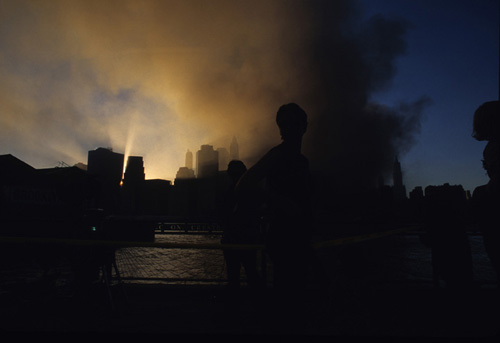

Viewing the plume from the World Trade Center at dusk on September 11, 2001. ©2001 Derek Henry Flood
New York -- In advance of the tenth anniversary of 9/11, I scanned a number of never before seen images that I shot on that ashen evening a decade ago. I knew this anniversary day would eventually come but it is all still so vivid a decade on. 9/11 led me all around the world from Brooklyn to Kunduz to Hamburg to Najaf to San Diego to Kuala Lumpur to Tarragona and on and on. I have followed both the trail and aftermath of this event more doggedly than almost anyone else out there.
What sets my story apart is that I simply lived much of it. I lived in San Diego when hijackers Nawaf al-Hazmi and Khalid al-Midhar did. I rode my skateboard past the mosque where they prayed in the city's Claremont section. They rented a room from a man who had been an English instructor at my school. I used to deliver pizza to the apartments across the street from Anwar Awlaki's mosque. I put gas in my Honda Civic at the Texaco in La Mesa where Nawaf al-Hazmi landed a sympathy job. My intense, if offbeat curiosity led me to meeting stern members of the Taliban in Peshawar less than a year before 9/11 when I was writing what would become my university senior thesis. As a young photographer, I was fascinated by the idea of a retrograde regime that attempted to ban photography. I saw burly Talibs knock around Chitral in a convoy of pristine white Toyota Landcruisers, black turbans and all. At the end of a backpacking trip in 1999 I had bought an Urdu language biography of Osama bin Laden at the Lahore airport and was very well acquainted with the man and his global agenda.
For those that followed bin Laden and Salafi-jihad, 9/11 was less a shock out of the blue than the next logical step. My father had been at work in his office in February 1993 when the reverberations of Ramzi Yousef's massive truck bomb attack failed to knock down the World Trade Center down then, killing six in the process. Like the movie poster for the film Syriana, "Everything is connected." A a college professor of mine who had been in the Nixon administration, when describing the US-Soviet nuclear arms race of that era, described history thusly in relation to the proliferation and technological progression of means of violence: "Once something is invented, it cannot be dis-invented." What was true for advancements in nuclear weaponry would also ring true for comparatively low-tech terrorism. If the World Trade Center had been gravely attacked once, what would discourage a successor group from attempting to achieve the same goals through different means?
I was already planning a trip to Afghanistan when 9/11 happened with the help of famed photographer Luke Powell who photographed pre-war Afghanistan's most iconic images. Literally days before the attack, I was in the process of tracking down the Taliban at their office on Main Street in Flushing, Queens which they had set up to lobby the UN (unsuccessfully) for international recognition beyond that granted to them by Riyadh, Abu Dhabi and Islamabad. I was in touch with Rafaelle Ciriello, the Italian photojournalist who had shot what would turn out to be Ahmad Shah Massoud's obituary photo in the NY Times. He would in turn be shot dead by an Israel Defence Forces conscript in Ramallah just six months later. The carnage would certainly not end there.
Witnessing 9/11 in New York allows one a few exemptions. Having been in Manhattan and Brooklyn that day (and having been in Pakistan before and Afghanistan afterward) allows me the intellectual liberty of never having to entertain tiresome conspiracy theories. There is a certain righteousness in tragedy. If I choose, I don't have to listen to anyone's opinion who was not there about what they think happened... much less anyone who has never been to New York or the US as they pontificate their seemingly ridiculous, sometimes insulting ideas. And if that comes off as arrogant or strident, well then perhaps it does. But I bore witness. There was a conspiracy behind 9/11. It involved a group of Arab Salafi-jihadi men who sought to punch a hole in the heart of the West.
Yes there are a ton of things we can never understand about how exactly things went down that day or what transpired in Hamburg and the Afghan camps before 9/11. Yes the 9/11 commission report is full of holes, vague on many, many details, and is an overall shoddy document. But none of that amounts to the justification of nonsensical 9/11 theories put forth by armchair crackpots, conspiracy minded Peshawaris, or inherently anti-American social democrats. And finally, yes, 9/11 justifies almost none of the clumsy, giant footprint military actions that took place in its aftermath. 9/11 was never a justification for big wars, human rights abuses or going to bed with gruesome dictatorships (think Islam Karimov's Uzbekistan et al).
It was not 9/11 itself that heralded the stark polarization so desired by al-Qaeda. It was the response to 9/11 that divided the world more than the post-colonial, post-war realm had already been. A decade of talking about who has won and who has lost is both immaterial and intellectually childish. It was never about winning or losing. It is about carrying on with life. Getting on with the business of this awkwardly, unevenly integrating world. Forget about the concept of globalization and its discontents.
My dream morphed into a mission. Photographer became photojournalist. A day turned into a decade. Photojournalist became journalist. Life into death. Day into night. And yet dark into light